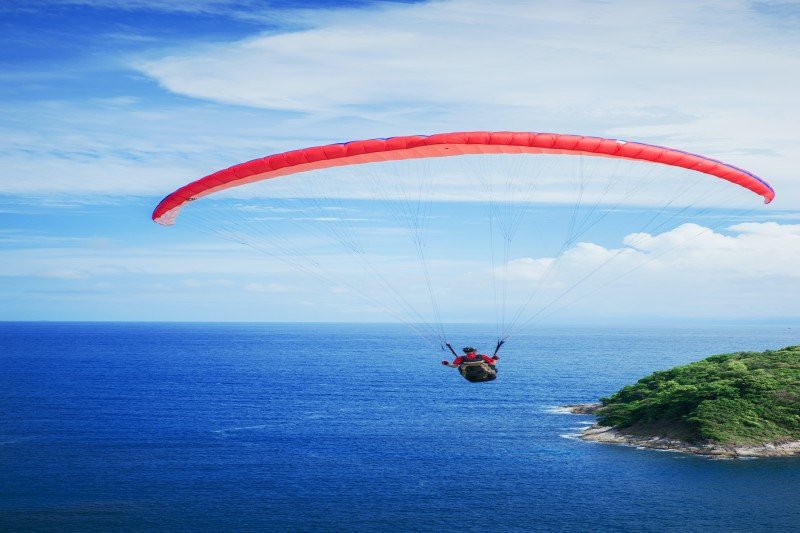Base jumping carries with it an unmistakable allure. It gives one the exhilarating joy of the wind beating at one’s face, and one’s adrenaline and dopamine levels spiking up exceedingly. Knowing what ways base jumping is addictive helps us in deciphering the attraction for the risky activity.
Generally, there is the tendency among certain individuals to take extreme risks. According to Karen Doll, people sometimes, take part in risky behavior because of the appeal and rush of excitement that comes as a reward for the risk. Oftentimes, base jumpers take quite insane risks and break laws to engage in the activity. It is important to note that risk aversion or desire, is not binary or polar, but complex. This is because people may be willing or averse to take risks depending on the circumstances.

The decision to take a certain risk may come from the individual’s perception of the reward/benefit accruing from the risk. As an extreme sport, one is wont to ask, with regards to base jumping: Is base jumping addictive?
What is an addiction?
According to the American Psychiatric Association, addictions can take various forms. Some addictions are with regards to substance use disorder, while others stem from behavioral choices. In this regard, while some persons may be addicted to substances or things, others may be addicted to activities. A crucial addition to this definition is that this particular substance, behavior or activity would have the tendency to cause harm, physically, psychologically or socially to the individual. Also, upon withdrawal from the substance, thing or activity, the individual would experience irritability or nausea.
A significant reason why individuals get addicted to these substances, or activities come from the thrill or excitement that comes from their use or employment. Furthermore, in the case of substance abuse, some of the reasons why people engage in it differ from:
- The experience of a unique feeling of heady pleasure and intoxication.
- The experience of numbness and light-headedness that helps relieve stress.
- The effects of heightened perception and thinking.
- The lure of curiosity and experimentation.
In all of these, there is a clear perception of reward from the risky activity or behavior. As such, this reward, for the individual, in most circumstances, is the feeling of exhilaration that comes with the experience.
Adrenaline addiction and base jumping
When in visible danger, our body releases a hormone, adrenaline, to keep us alert and prepare us for any eventualities. It helps to prepare our bodies for fight of for flight. With its secretion into the blood system, the individual becomes greatly alert and active. Adrenaline spikes up the blood pressure and increases the heart rate. The pupils of the individual dilate, and the breathing becomes much more rapid. Also, there is a heightening of the individual’s perceptiveness as his senses are on high alert. The secretion helps in the reduction of pain perception, and makes the muscles tensed for action. In addition to the secretion of adrenaline, dopamine levels contribute to a fever rush in the individual. Feelings of excitement and pleasure stimulate the secretion of this chemical in the body, and are a key factor in addictive behaviors.
This adrenaline rush or dopamine flurry of excitement is what we, largely, experience when exposed to high risk situations. Whether one is jumping off a cliff, or faced with highway robbers, our body prepares us for defense or survival. Individuals, sometimes, get addicted to the resultant pump and exhilarating energy that comes with this experience. Like opium, or a hard drug, adrenaline gives us much the same effects, and places us on high alert. High risk activities like speed racing, or skydiving, or base jumping, help to catalyze these reactions. Relevantly so, base jumping and skydiving are different, even though they still afford the individual a similar feeling of ecstasy and euphoria. In all of these, it is important to critically understand if these experiences make base jumping addictive for these adrenaline junkies.
Is base jumping addictive?

As a result, it is most times, this ecstatic experience that makes base jumpers drawn and strongly attracted to the extreme sport. Adrenaline junkies are individuals, captured by the alluring experience of danger and risk, who enjoy the bolt of energy and attention that it sparks into their senses. Base jumping refers to the activity of jumping from high places. This jump could be from a tall skyscraper, building or monument, or antennas. It could also be from the height of massive bridges. And finally, from large earth bodies like mountains, canyons, cliffs, fjords, etc. The base jumper equips himself/herself with a parachute or wingsuit to help him/her to glide to safety after the audacious jump. The experience of base jumping stimulates a large release of adrenaline to the body.
Without a doubt, base jumping seems to be addictive. This is because risk-taking captivates and excites base jumpers, who do so out of the desire to experience the rush of adrenaline and dopamine. Even in states, where base jumping is illegal or prohibited, these base jumpers go ahead to engage in these activities. These are proofs of the addictive power of the base jumping activity.
Base jumpers find in this activity of extreme sport, a way of experiencing high intoxication and energy, as well as, freedom and light-headedness. Apart from the addiction to adrenaline, the exciting escape from gravity that a jump of such sort brings, attracts base jumpers.

